For a long time, the lightweight, round-tubed SuperSix defined Cannondale’s road bikes. That changed in 2018 when Cannondale launched the SystemSix, a bike it claimed was “the fastest road bike in the world”. A bold claim but it was backed up by a detailed paper and data from tests against its competitors.
The industry hasn’t stood still, though, with competitors releasing new models and some brands killing off their aero bikes (see the now-defunct Specialized Venge). Just how does the SystemSix stack up? It’s still incredibly fast and I’d argue many bikes are still playing catch-up.
Cannondale SystemSix Hi-Mod eTap AXS frame
This Halo-spec model gets SRAM's flagship Red eTap AXS wireless groupset and Cannondale’s 64 SL KNOT carbon wheels.
The Hi-Mod frameset uses Cannondale’s stiffest, lightest carbon fibre and while Cannondale’s KNOT handlebar mimics the look and performance of an integrated setup, its two-piece design doesn’t limit adjustability. The KNOT stem also allows the angle of the bar to be adjusted by up to eight degrees.
Handlebars are available from 38cm to 44cm and stems from 80mm to 120mm.
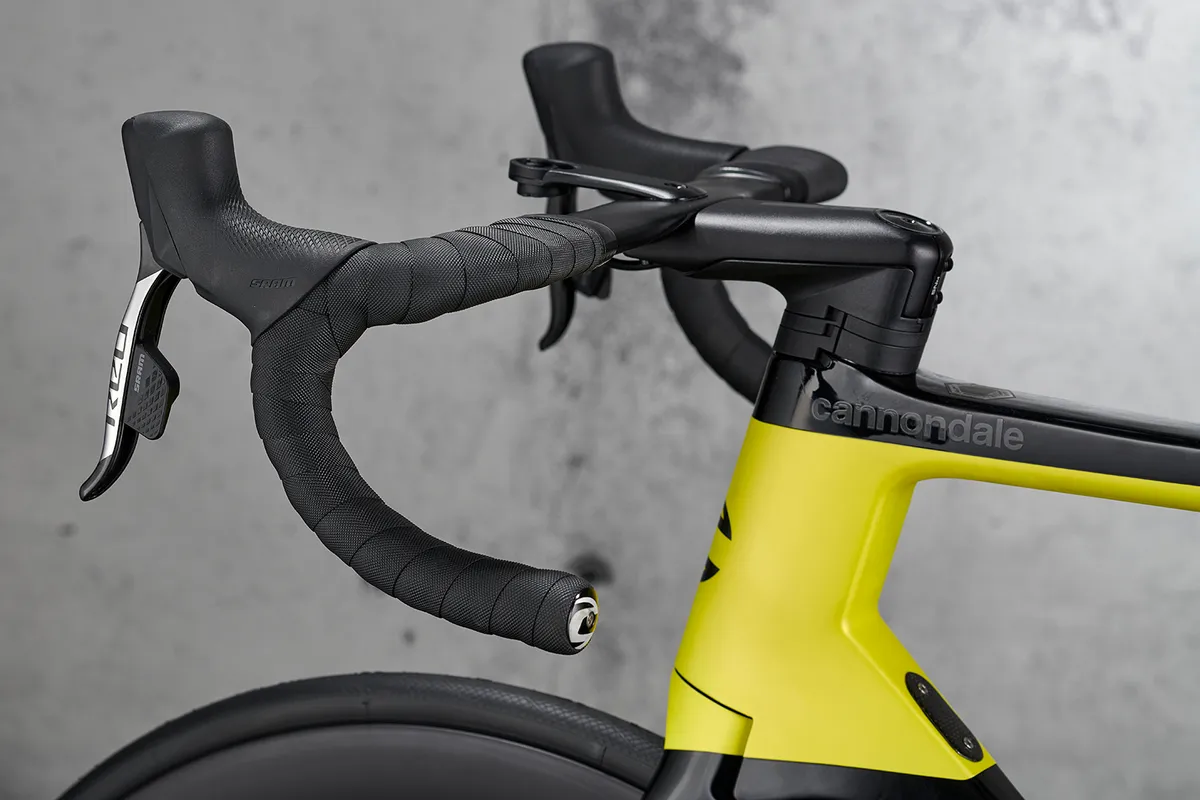
The solution to hiding the cables is elegant. Rather than using anything proprietary or complicated, the SystemSix simply routes everything through an opening in the head tube, allowing the use of a standard steerer and headset – there’s even a headset cover designed specifically for use with a standard, 1 1/8in stem and handlebar (available separately), if you don’t like the Knot option
The trade-off is that the steering range is limited to +/- 50 degrees to prevent the cables getting squashed, though outside of very tight turns this isn’t an issue for day-to-day riding.
Given the frameset's chunky looks, my initial thought was whether it would be fast in a straight line but ponderous in the corners. That’s not the case. It’s rapid in a straight line but feels nimble and exciting for group riding and when you’re throwing it into tight corners.
Cannondale SystemSix Hi-Mod eTap AXS geometry
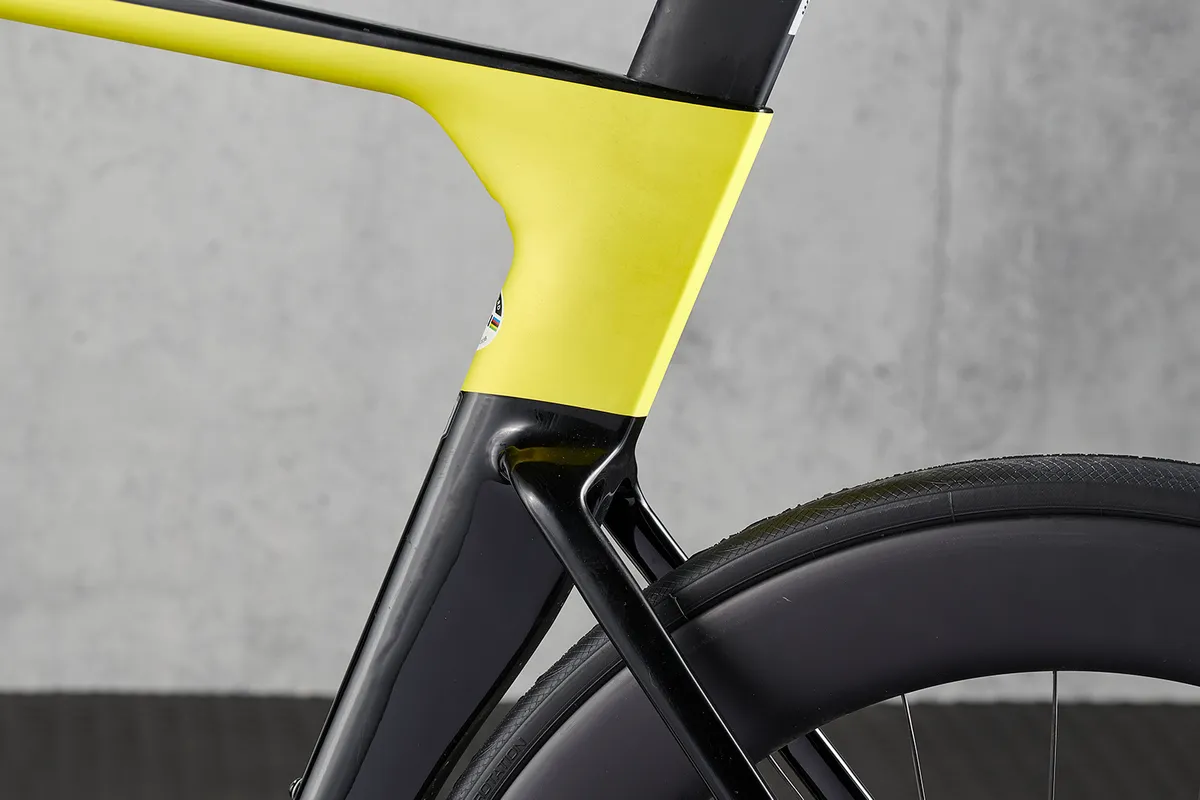
My 58cm test bike has a stack and reach of 580mm and 398mm, respectively, making it slightly longer and lower than the SuperSix. It also gets a 17-degree stem to keep things aero and aggressive.
Combined with 73.5- and 73-degree seat- and head-tube angles, 405mm chainstays and a 1,000mm wheelbase, it’s impressive how sharp the SystemSix feels.
It’s surprisingly comfortable too. While the front end is all about aerodynamic efficiency, the seatstays and chainstays have been optimised for compliance.
| | 51 | 54 | 56 | 58 | 60 | 62 |
|---|---|---|---|---|---|---|
| Seat angle (degrees) | 74.7 | 74.3 | 73.9 | 73.5 | 73.1 | 72.7 |
| Seat angle - effective (degrees) | 74.1 | 73.7 | 73.3 | 72.9 | 72.5 | 72.1 |
| Head angle (degrees) | 71.2 | 73 | 73 | 73 | 72.9 | 72.9 |
| Chainstay (cm) | 40.5 | 40.5 | 40.5 | 40.5 | 40.5 | 40.5 |
| Seat tube (cm) | 43.3 | 8.2 | 53 | 55.3 | 57.7 | 60 |
| Top tube (cm) | 52.9 | 54.4 | 56 | 57.6 | 59.2 | 60.9 |
| Head tube (cm) | 11.4 | 12.8 | 14.9 | 17.2 | 19.3 | 21.4 |
| Fork offset (cm) | 5.5 | 4.5 | 4.5 | 4.5 | 4.5 | 4.5 |
| Trail (cm) | 5.8 | 5.7 | 5.7 | 5.7 | 5.8 | 5.8 |
| Bottom bracket drop (cm) | 7.4 | 7.2 | 7.2 | 6.9 | 6.9 | 6.9 |
| Bottom bracket height (cm) | 26.6 | 26.9 | 26.9 | 27.1 | 27.1 | 27.1 |
| Wheelbase (mm) | 989 | 975 | 987 | 1,000 | 1,012 | 1,024 |
| Standover (cm) | 72.3 | 76.2 | 79.8 | 82.1 | 84.3 | 86.3 |
| Stack (cm) | 52 | 54 | 56 | 58 | 60 | 62 |
| Reach (cm) | 38.1 | 38.6 | 39.2 | 39.8 | 40.3 | 40.9 |
Cannondale SystemSix Hi-Mod eTap AXS ride impressions
It works remarkably well and the SystemSix's 25mm tyres measure around 27mm on the KNOT rims, which have a 21mm internal width; the SystemSix can accommodate tyres up to 30mm wide, so bring on the cobbles.
The KNOT wheels handle impressively. With 64mm deep rims you expect them to be fast – and they don’t disappoint. Their 32mm external width also contributes to exceptionally calm handling, even on gusty days.
Weighing around 63kg, I did feel the push of the wind when passing gaps in hedgerows and the like, but it was never enough to knock me off course or reach for the brakes. With the wind behind you they absolutely sail.
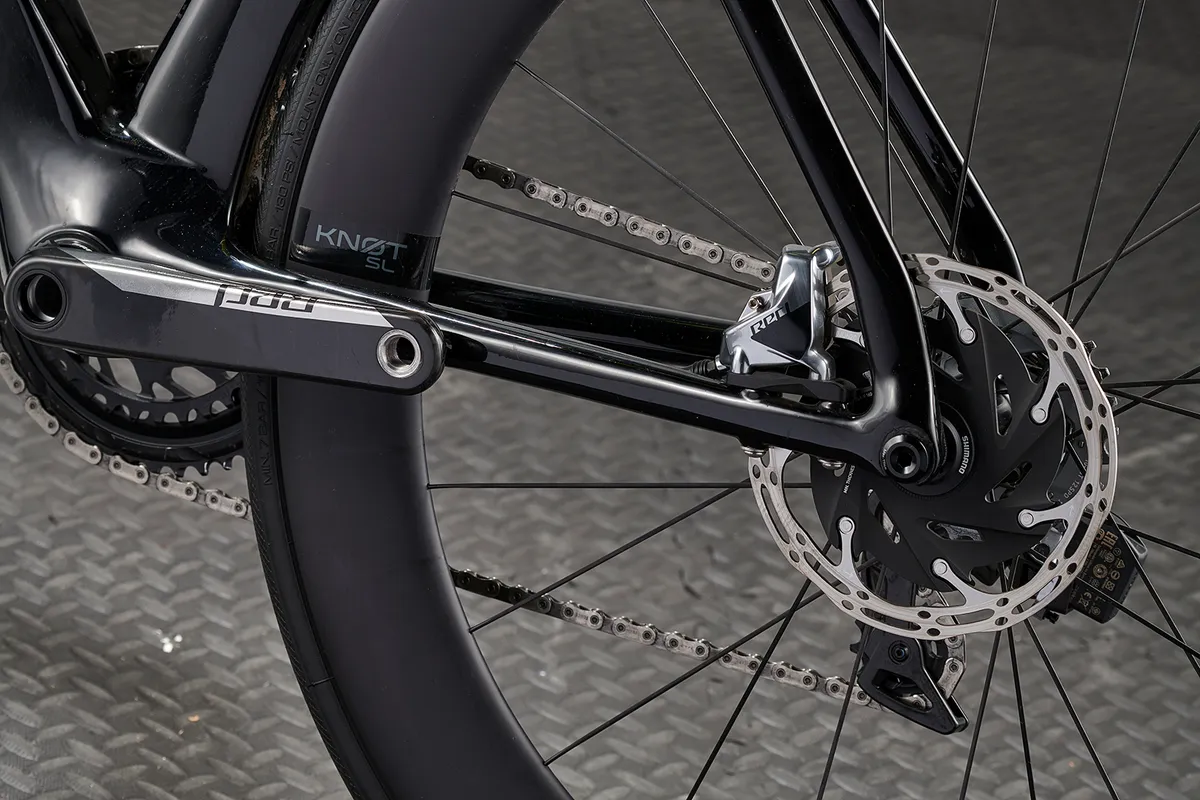
If I was nitpicking, Vittoria's Rubino Pro Speed clincher tyres wouldn’t be my first choice. They’re fast and Cannondale insists they strike the best balance of rolling resistance and aerodynamics, but some of that speed comes via the omission of a puncture protection belt.
Fine for short events and time trials, but possibly less appropriate for longer races or general riding. The KNOT wheels are tubeless-ready, so I’d look for a fast, tubeless option.
SRAM’s electronic groupset makes a solid contribution even if shifts are slightly more hesitant than those on Shimano’s Di2. However, the lever hood ergonomics are excellent and the programmable shifter buttons incredibly intuitive.
Despite my unease with the 10-tooth sprocket and smaller chainrings from a drivetrain efficiency point of view (although how clean you keep your bike will likely play a much larger role in component wear rates), payback comes in the form of a tightly spaced cassette, which helps you moderate your efforts more precisely.
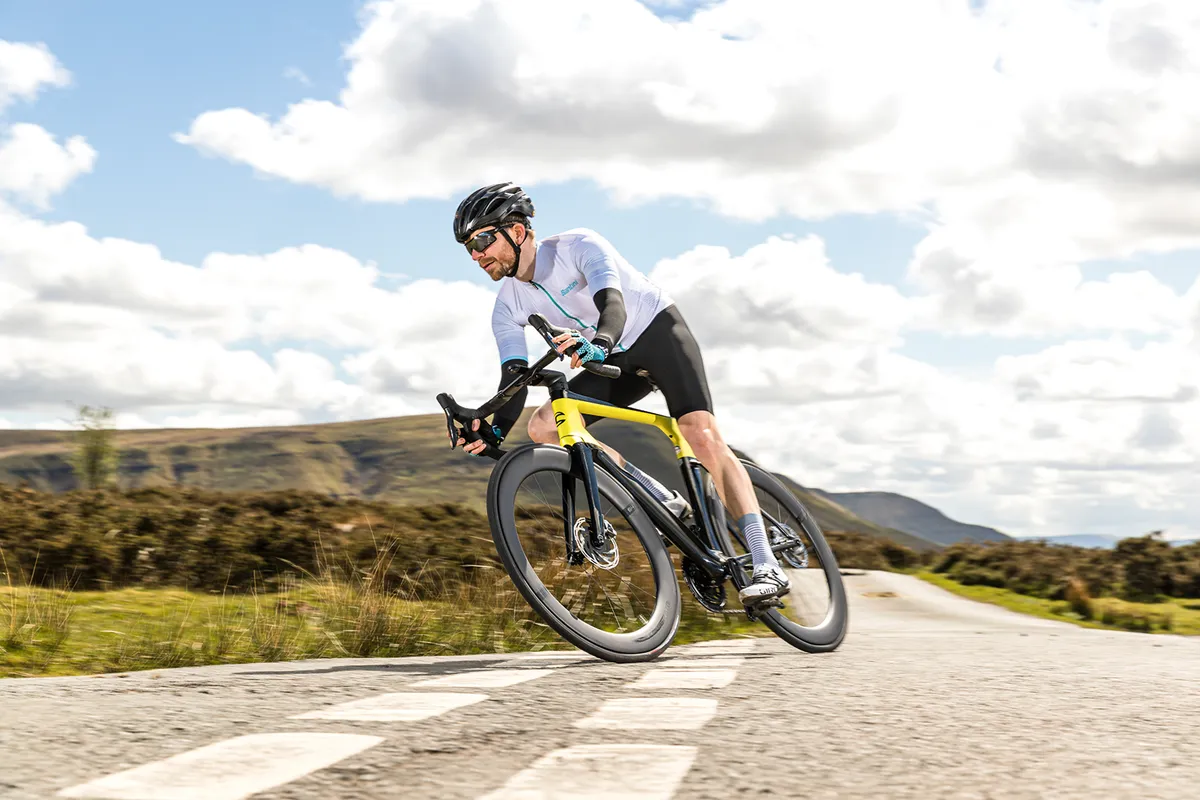
The SRAM Red hydraulic brakes with 160mm rotors front and rear offer plenty of power and modulation. The brake pads do sit very close to the rotor, so it was possible to elicit the occasional bit of rub when climbing out of the saddle, though not enough to feel like it was sapping energy.
The SystemSix's 7.9kg weight (without pedals or bottle cages) isn't exceptional but this doesn’t make any difference to how fast the bike is – the aero gains are worth it.
Cannondale SystemSix Hi-Mod eTap AXS bottom line
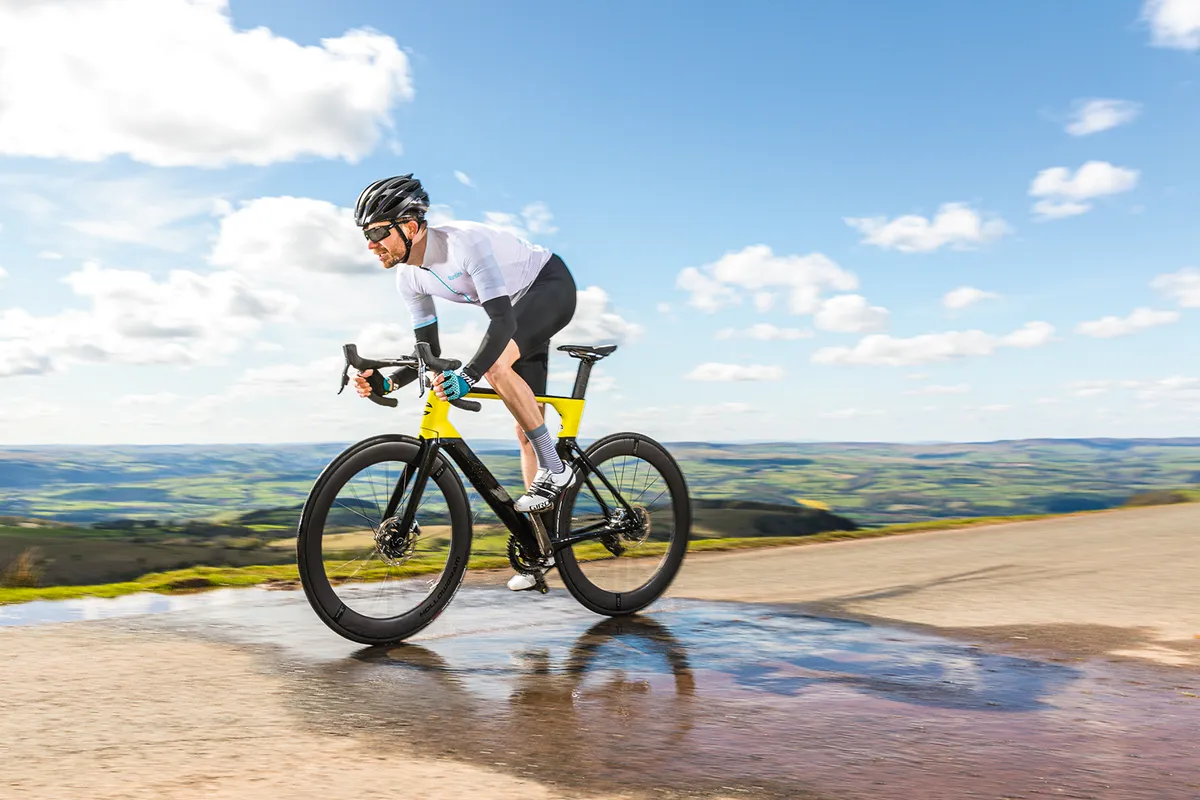
There are few bikes I’ve ridden that come close to matching the sensation of speed you get with the SystemSix, and the fact that it combines that with excellent handling and a comfortable ride is fantastic.
Yes, it's expensive, but you can buy it from a physical shop, the frameset does come with a limited lifetime warranty and when you compare it to the similarly specced competition it’s quite competitive.
How we tested
We tested four of the latest aero race bikes to find out if speed means less comfort and usability. Do the deep-section wheels make it a handful on windy days? How does it perform on our broken back roads? And do you need an engineering degree to maintain it?
They are a range of price points (although none are exactly cheap) to see whether spending more money does actually buy you more speed, and if more integration is always better.
Also on test
Product
| Brand | cannondale |
| Price | 10500.00 GBP,12500.00 USD |
| Weight | 7.9000, KILOGRAM (58cm) - |
Features
| Fork | Cannondale SystemSix Hi-Mod Carbon |
| br_stem | Cannondale HollowGram KNØT |
| br_chain | SRAM Red 12 speed |
| br_frame | Cannondale SystemSix Hi-Mod Carbon |
| Tyres | Vittoria Rubino Pro Speed 700 x 25c |
| br_brakes | SRAM Red hydraulic disc |
| br_cranks | SRAM Red 48/35t |
| br_saddle | Fizik Tempo Argo R3, 150mm width, K:ium rails |
| br_wheels | Cannondale HollowGram 64 SL KNØT |
| br_headset | Cannondale |
| br_shifter | SRAM Red eTap AXS |
| br_cassette | SRAM XG1290 10-28 |
| br_seatpost | Cannondale HollowGram 60 KNØT |
| br_handlebar | Cannondale HollowGram KNØT |
| br_bottomBracket | SRAM DUB PF30a |
| br_availableSizes | 51, 54, 56, 58, 60cm |
| br_rearDerailleur | SRAM Red eTap AXS |
| br_frontDerailleur | SRAM Red eTap AXS |
